The Palestine solidarity encampment on the quad represents a significant trial for the University of Chicago’s frequently emphasized commitments to academic freedom and free expression. This challenge arises from internal tensions within the policies of the University, connected to the questions of what constitutes disruption, and what constitutes institutional ideological neutrality. It is of great importance for our academic community going forward that we as an institution face this challenge with integrity despite the difficulties that may be involved.
The conflict within university policy occurs between the prohibition on erecting unauthorized structures and the University’s commitment to students’ rights to free expression, unless the exercise of those rights is disruptive to the larger University community. It is true that the encampment is in violation of the former policy. At the same time, there is no sense in which the encampment can be described as disruptive in any fair way. In University President Paul Alivisatos’s Monday email on the subject, he characterized the possible disruption in terms of the cost to the University of maintaining a police presence. This is a stretch. By this logic, for example, legally protected strike activity by instructors in the College would be a violation of University policy, since it is—by design—costly to the University.
Under the University’s own policies, disruption sufficient to warrant the suppression of free expression must be something more than inconvenient, annoying, offensive, or costly. It must actually prevent some members of the University from carrying out their functions or making use of the institution’s facilities. Making a small portion of the quad unavailable to pedestrians does not remotely qualify.
We should be vigilant that our institution not join the stampede of others rewriting policies on the fly, explicitly or implicitly. Northwestern University and Indiana University, for example, both recently inserted new ad hoc justifications for clearing their encampments into their policies when their leaderships realized that they did not actually have sufficient warrant for doing so. Attempting to buttress their case, Indiana went so far as to argue that the encampment “coincides with” rising antisemitism, and that “antisemitic episodes have been linked to this national encampment campaign.” While antisemitism must be confronted whenever it appears, ominous and vague implications and guilt by association written in the passive voice to create the false appearance of intimidation will not do. As a Jew and a descendant of refugees from Nazism, I have appreciated that our institution has not joined others in recent months in systematically conflating Zionism, a modern political idea, with my religion and ethnicity, and thus has not treated anti-Zionist speech as intrinsically discriminatory and intimidating.
In fact, there has been precious little demonstrable anti-semitism at any of the encampments around the country, which frequently involve significant Jewish participation. (Much of the concern coming from Columbia University arose in response to a handful of incidents occurring not on campus, but outside it, independent of student protest activity.) This is presumably the reason that hostile provocateurs now regularly attempt to instigate anti-semitic chanting, or seek to stimulate confrontation and then claim baselessly to be in danger. Indeed, even protesters’ disciplined non-engagement with provocateurs has now, more than once, been presented as intimidating in itself. Such escalatory tactics all require vigilance too. Nor is it acceptable to argue that slogans such as “from the river to the sea” imply violence. After all, the same language is in the founding charter of Israel’s ruling Likud party, whose express policy is that Palestinians will never have a state, and which actually has implemented this single-state vision in the present. It would thus be impossible to prohibit the organizations, images, rhetoric, and symbols of the Palestine solidarity movement evenhandedly without also taking steps against the organizations, images, rhetoric, and symbols of Israel—steps that we have never seen at the University of Chicago or in any major institutions of American life.
In his email, Alivisatos described an encampment as a vaguely coercive undertaking, drawing a contrast to rational persuasion. This is a troubling idea for several reasons. First of all, all effective protest contains an element of coercion. It always has. For the past three years I taught America in World Civilization II, in which Henry David Thoreau’s classic essay on civil disobedience is a fixture of the syllabus. “Any man more right than his neighbors constitutes a majority of one already,” Thoreau famously writes. “A single man can bend [the government] to his will.” If this idea is objectionable to you, then women’s suffrage, African American civil rights, and the abolition of slavery must be equally objectionable, for Thoreau’s principle was absolutely central to how these victories were won. Onlookers did not experience sudden persuasion by these movements. Rather, as even cursory familiarity with the writings of Fredrick Douglass, Alice Paul, or Martin Luther King Jr. will tell you, these movements deliberately sought to coerce their opponents by creating unresolvable political dilemmas for them. “Nonviolent direct action seeks to create such a crisis and establish such creative tension that a community that has consistently refused to negotiate is forced to confront the issue,” wrote King in “Letter from Birmingham Jail.” Note the word “forced,” like Thoreau’s “bend.”
The secular sainthood of such individuals is always a retrospective phenomenon, arising after their challenges have passed and they can be safely canonized. In their own time, they were more widely hated than loved, and it was common for opponents to represent them as apostles of violence and intimidation. “The old violence parades today in a new uniform,” said Richard Nixon in a 1968 campaign speech critical of the civil rights movement. “At home, it may masquerade as ‘civil disobedience,’ or ‘freedom,’ and it sometimes marches under the banner of legitimate dissent.” In contrast, Nixon argued that Americans “have the means to correct [injustice] in a peaceful and orderly fashion. America was born in revolution. But the architects of the new nation saw clearly that if the society was to be secure, the means of peaceful change had to be provided. They built into our structure what the colonies had rebelled for lack of: a system by which the people of America could be masters of their own destinies, in which all could be heard, and the power of persuasion substituted for the power of arms as a means of bringing about progress and change.”
To point toward rational persuasion over Thoreau’s style of principled nonviolent coercion would be more reasonable if any means of persuasion appeared available. They are evidently not. The College Council, for example, has voted twice over the past decade to affirm its support for the movement to boycott, divest, and sanction Israel—despite tremendous pressure to retract this position. If the administration is committed to rational deliberation, then it ought to give members of its community a genuine opportunity to persuade it: insisting on this course without actual openness to persuasion is senseless and beneath our traditions of reasoned engagement. And if the University community has no means to make itself heard democratically, then nonviolent action is to be expected.
If we do see repression of the protest by violent means or those of administrative punishment—an eventual possibility implied in official emails on Monday—it will naturally raise a question about what was so disruptive about the encampment. What happened last night at Columbia University and City College of New York, with unarmed and nonviolent students beaten and possibly gassed, is a shame that will hang over that institution for decades; a police officer was observed texting “thought we fucking shot someone.” It cannot be repeated here. Any such attempt inevitably will lead to another question about the University’s insistence that it is simply an ideologically neutral actor. After all, a former Israeli general taught a class on “counterterrorism” at our university, and Alivisatos recently met with Israeli consul general Yinam Cohen; the same cannot be said for Palestinian voices. Hillel has a well-established presence on our campus, which it uses to advocate on campus for its preferred policies in relation to Israel and Palestine; Palestinians have no similar such institutional presence.
For many years, there have been critiques of the Kalven Report and the Chicago Principles from the political left, arguing that these regulations are only formally neutral, but de facto slanted against the causes of social justice to which many of us on campus are ethically committed. While I still believe there is truth in that critique, since October 7 and the national environment of ideological repression that has resulted from it, I gladly admit I have felt grateful for the protection of the Chicago Principles and correspondingly humbled. Now, however, we will see the commitment put to a stringent test. The encampment embodies only free expression and modest inconvenience: what is most disruptive about it is not the form of its presence, but the content of its ideas. Clearing it by force or punishment would make a mockery of the Chicago Principles.
Gabriel Winant is assistant professor of History at the College.


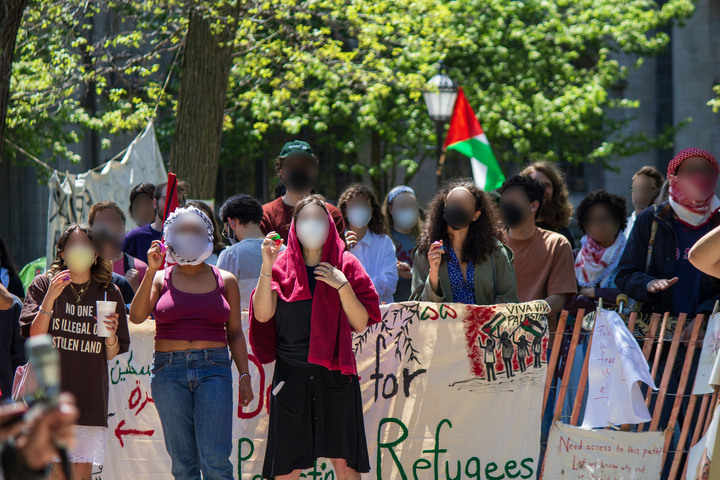
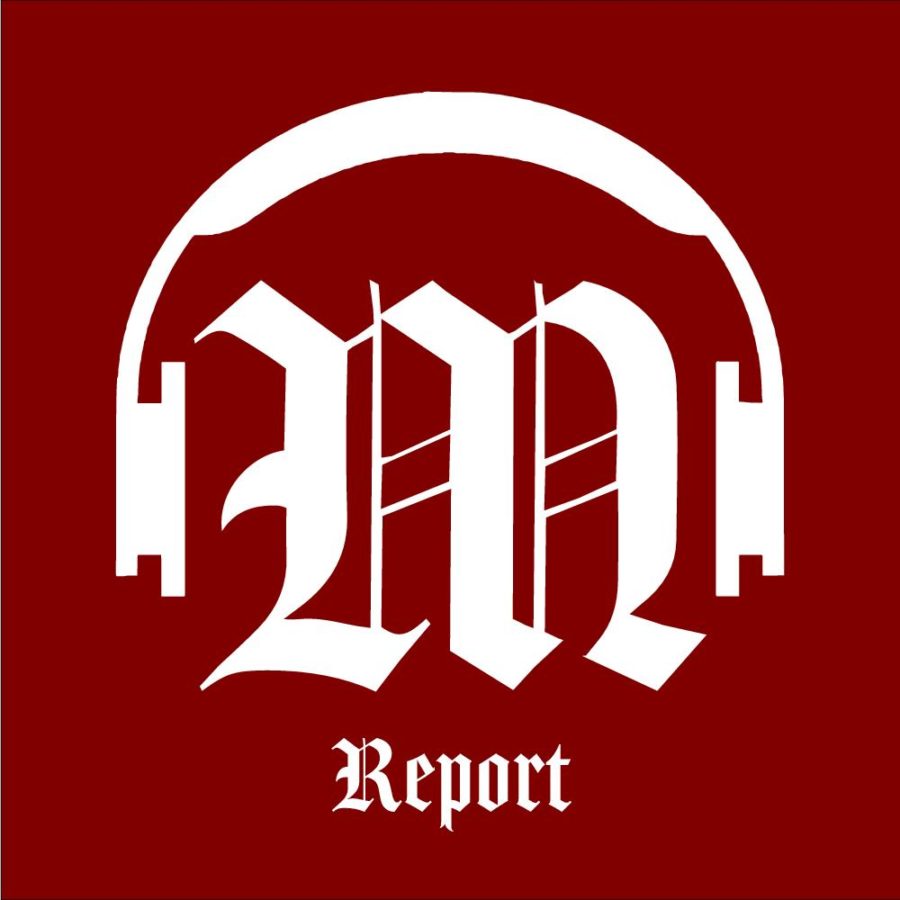
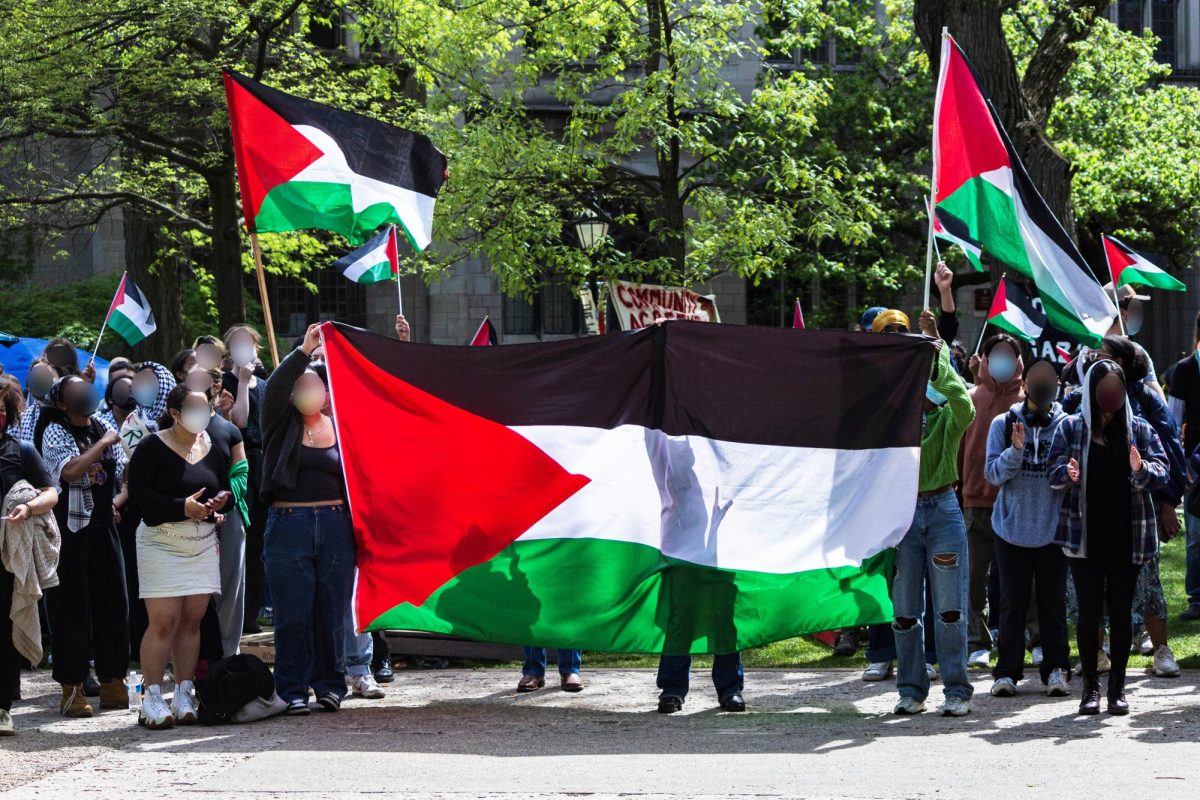

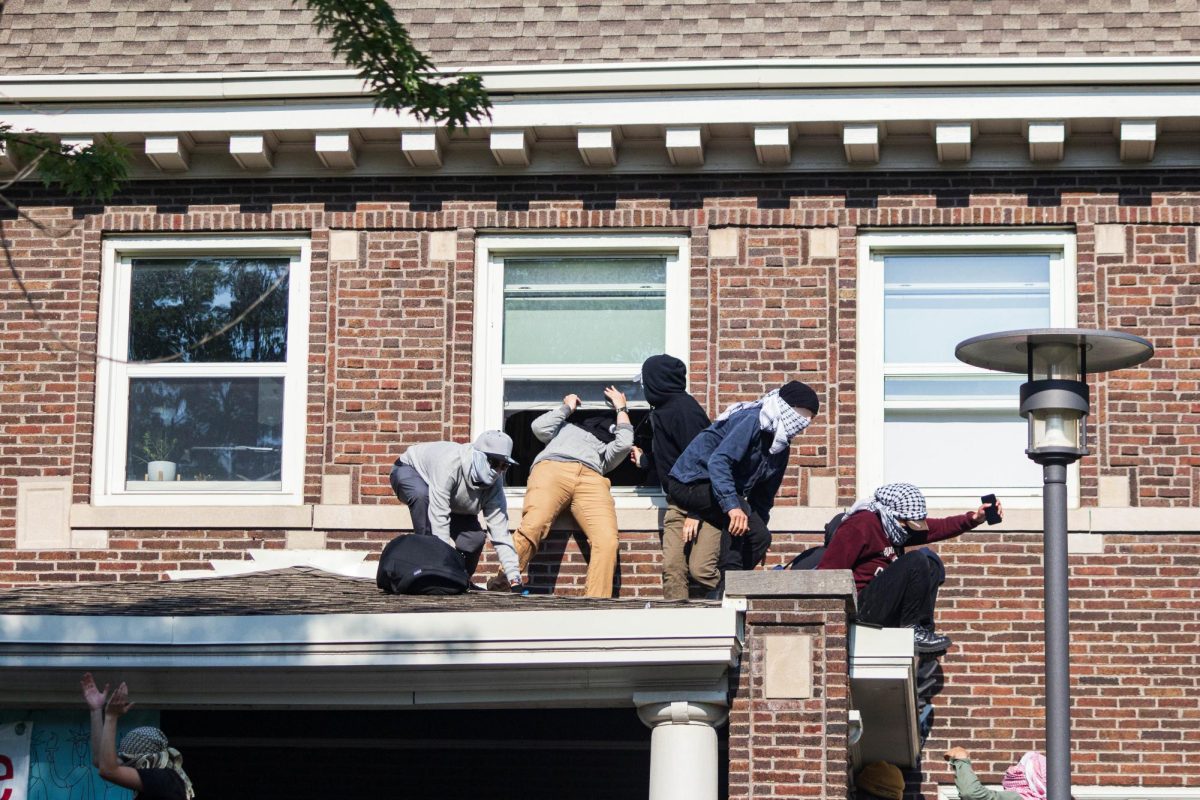
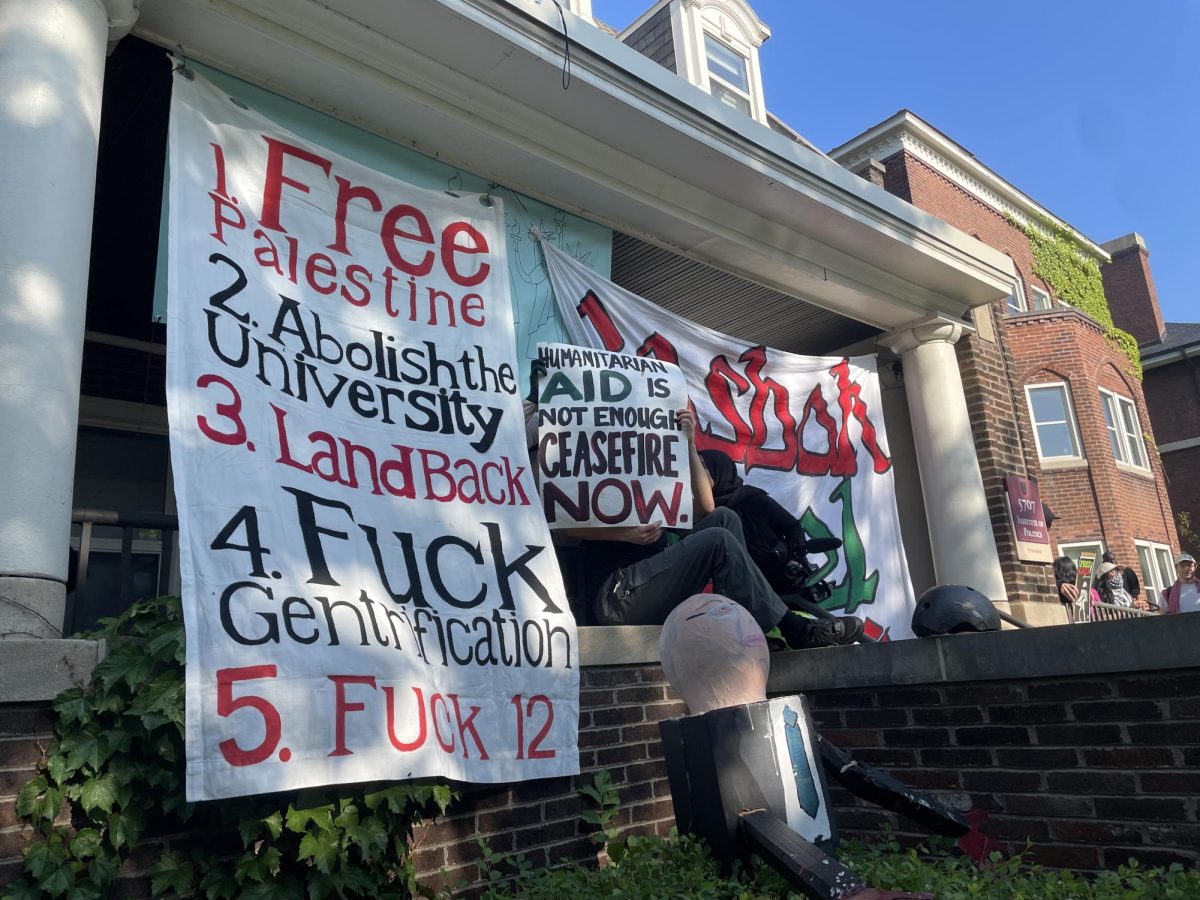












Collin / May 7, 2024 at 12:02 am
Blocking students and employees movement and making explicit calls to violence do not fall under the purview of free speech, either legally or morally. I’m sick of radicals pretending like they have a principled commitment to free speech when they routinely trample on liberal values when given the opportunity or when it doesn’t benefit them.
Frank Paul / May 3, 2024 at 5:24 pm
It is interesting that we celebrate the Boston Tea Party as an example of legitimate protest. It seems that it caused a bit of disruption. There is disruption and there is violence. The first can be tolerated, the second controlled. In situations of this kind, there are always two aspects to be considered: the theoretical and legal implications and the practical and reasonable response to them. The more severe the response, the higher the possibility of being wrong. Sometime, you have to give a little.
MV / May 3, 2024 at 9:37 am
I don’t get the author’s point. There is no “conflict” here. First, a mass of students living in tents and protesting in the middle of the quad would seem to me to be disruptive by its very nature. After all, isn’t that the point of these protests? And I wonder if the author will hold the same views in a matter of weeks if the encampment remains while the University attempts to hold events for Alumni Weekend, Convocation, and so forth, which requires building other structures and holding events on the Quad. Still, even accepting the author’s conclusion on this point, I don’t understand how that fact exempts them from the first violation: the “prohibition on erecting unauthorized structures.”
The author admits “the encampment is in violation of [this] policy.” So why would that not be the end of the discussion? In other words, under what premise do the students deserve special treatment for breaking *this* rule? The University isn’t asking them to stop protesting, just to break up the encampment. There are other ways to do this.
The author suggests they can keep the encampment because it’s not disruptive. Yet, being ‘not disruptive’ is a factor relevant to the expression of speech on campus; it doesn’t give them permission to break other rules. In short, the fact that they arguably are not breaking the latter rule, does not exempt them from definitely breaking the former.
James Wallace / May 2, 2024 at 7:06 pm
Professor Winant is free to submit an essay full of fallacious reasoning to convince others of the correctness of his views. That is free speech at work. If he can sway others to his worldview, go for it. If he can find students willing to pay for lectures long on verbiage and short on substance, take the money and run. I suppose he is a modest inconvenience to the University and its mission to give students a quality education. I would prefer if he could make a cogent argument, but the world isn’t a perfect place. Regretfully, because I find his argument unconvincing, he thinks he and his friends have the right to force me to accept their views or suffer their wrath. For disagreeing with them, they claim the right to force me to listen to them until I agree. My loss of rights is defined by them as a modest inconvenience. Yet, if I ask them to curtail their coercive tactics, that isn’t a minor inconvenience – it is the beginning of a fascist state.
Alum and former Maroon editor / May 2, 2024 at 12:12 pm
Who is blurring these images? If students are willingly taking part in public protests they should have no objections to their being photographed or videoed.
Paul Huang, AB14 / May 4, 2024 at 11:37 am
Part of the issue is that whomever is identified in those pictures automatically become subject to a host of online hate speech and violent threats.
James Wallace / May 5, 2024 at 9:11 am
The KKK made the same argument. Would you agree that law enforcement should be able to hide their identities while enforcing the law? They are frequently subject to hate speech and violent threats. Civil rights activists, who faced violent deadly attacks, proudly wanted the world to know who they were. Are the current protesters so unsure of their views that they refuse to let the world know who they are?
JP / May 2, 2024 at 9:55 am
This entire argument is based on the premise that the encampment is not disruptive.
Yet, the UCUP and SJP both stated in their own social media accounts that their intent is not to persuade but to disrupt.
The reality is that you can’t persuade, so you choose to disrupt. Perhaps you can’t persuade UChicago because the Jewish Zionist power controls the entire US Government, Hollywood, Wall Street, Universities, Press, etc. If that’s what you think, there are a lot of good reading materials in alt-right and supremacist websites, and you belong ideologically there (extreme right and left have a lot of commonalities). Or maybe is that your arguments are not persuasive.
Sam Huang / May 3, 2024 at 3:32 am
I would like to contend that even if we grant that the encampment is disruptive, a case can still be made for it. The position that we saw President Alivisatos took in his email to the UChicago community is one that upholds the right to protest but opposes “disruptive protests”. This position, I argue, reflects a fundamental conceptual misunderstanding of what protests are.
Properly so-called, all protests are disruptive, and their proper functioning depends on their being so. If being undisruptive can solve an issue, one might as well sit down and have a conversation. Disruptive protests serve as a last resort when other channels of peaceful democratic participation are restricted or compromised. Such disruptiveness is justified when its aim is to restore the proper functioning of peaceful channels for democratic participation.
One scenario in which other forms of democratic participation can be compromised is when people in positions of power refuse to abide by the rules of democracy. A democracy is more than just free expression and rule by the majority. Instead, it also assumes a variety of other qualities, such as respect for basic truths and respect for basic human rights. Without those qualities a democracy is unimaginable. It would become an ochlocracy, or rule by the mob. But it is precisely those important qualities that we see violated time and again by people in positions of power in the face of the situation in Gaza. It is a fact that genocide is happening. But people in positions of power are refusing to acknowledge that. It is common sense that if you are helping to wage a genocide, you have to stop doing it. This results directly from a proper respect for human rights. But people in positions of power are refusing to divest from the genocide machine. Instead, power, interests and ties are outweighing proper democratic discourse and decision making. The governing bodies of our institutions are refusing to take actions that result directly from democratic principles.
When such “bad actors” disrupt the normal functioning of a democracy, protests are justified as an extraordinary means to put a check on them. The “disruptive” nature of protests allow people to force the bad actors to reconsider by threatening their interests and power. Even though protests are disruptive to normal life, they nevertheless inhabit a unique role in the proper functioning of a democratic society. It is not the people setting up the encampments that are disruptive — it is those who are actively making a choice to participate in genocide that are disrupting the normal functioning of our society.
Mark / May 4, 2024 at 11:49 am
uChicago is not a democracy, it is private property.
While the protests are not currently disruptive and as such should not be removed. Should they become disruptive and interfere with the functioning of the University then the protection of Free Speech no longer applies.
The Freedom of Speech provided by the university is different from that provided by ‘democracy’. Under the law, the University has no obligation to allow Freedom of Speech on its private campus. It does so, because we as an institution have agreed that the pursuit of learning is best served by the open dissemination of ideas. Once protests become disruptive, it interferes with the pursuit of learning and the speech of others, and as such can no longer be tolerated.
Human rights, democracy and genocide has nothing to do with it.
PJ / May 1, 2024 at 6:36 pm
The most amazing thing about the present moment is that we are learning the extent to which Israel is a sacred cow in the USA. It only required some young people setting up tents and singing to provoke the Establishment to bring in the goon squads with clubs and tear gas. We’re seeing a toxic marriage of Zionism and Fascism.
Kornpett / May 1, 2024 at 5:49 pm
Professor Winant’s thesis is specious, positing a policy conflict that does not exist. You may practice free speech without an encampment, of course.
Hannah Thier / May 1, 2024 at 4:16 pm
This is fantastic, well thought out and well written.
Alum / May 1, 2024 at 10:39 am
You have to discard the 1960s mindset that screeching, screaming, rioting, and dwelling in filth are somehow “free speech.” As a student, you should practice the virtues of decency and gentlemanly conduct, not engage in cosplay “activism” while disrupting your fellow students. If you do wish to get dirty, work at a soup kitchen.
Anon / May 1, 2024 at 4:37 am
Submitted, edited, and published in record time! Well done, VP editors.
Seems the Maroon moves fast when it wants to, i.e., when antisemitic, pro-Hamas/DEI voices are submitted by a certain demographic *cough cough.* DEI is happy to oblige. God help those with dissenting voices—especially from people that don’t fit the Maroon’s victim narrative.